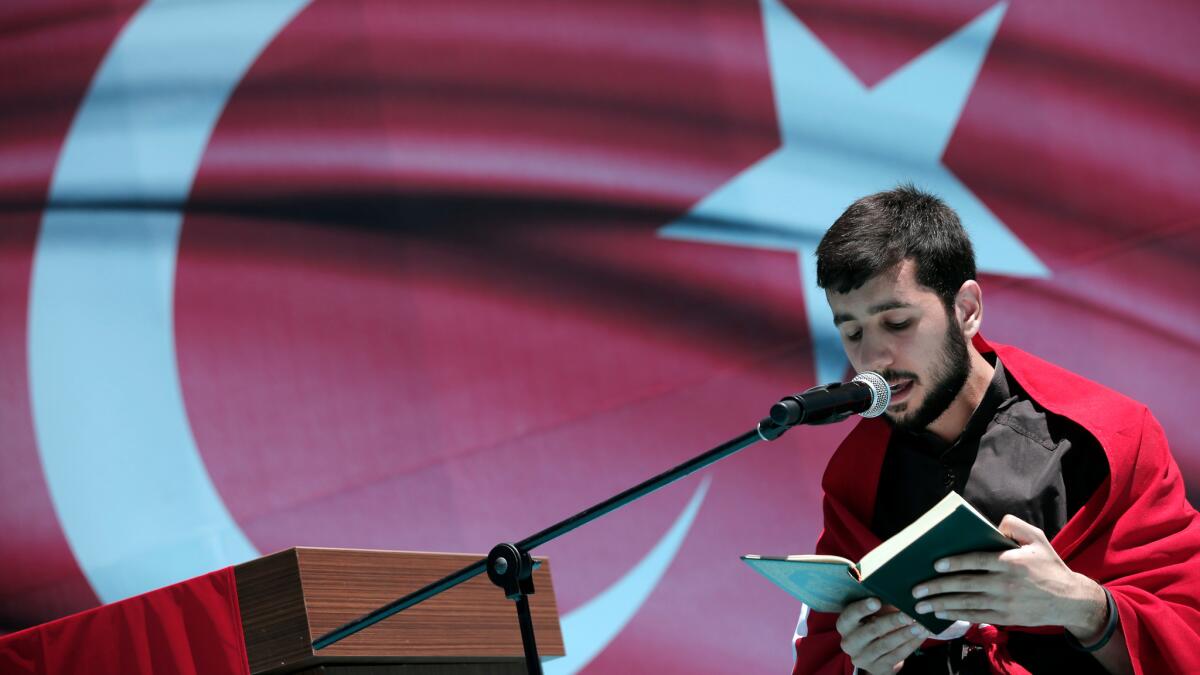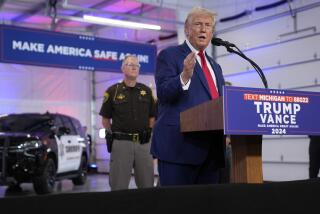Op-Ed: Coups have consequences — including making more room for Islam

- Share via
On two recent trips to Turkey to study constitutional reform, I asked everyone I interviewed — politicians, scholars, activists — if there was any risk of a coup in the country. They all said “Impossible.” Last Friday, as jets bombed the parliament in Ankara and tanks blocked the bridges of Istanbul, I realized I should have asked a few soldiers.
For the fifth time in six decades, Turkish armed forces tried to overthrow the government, declaring, as they always have, that they were defending the secular constitutional order. This time, for the first time, they failed, thanks to a defiant president calling citizens into the street using his iPhone.
The coup has been defeated; now the war begins. President Recep Tayyip Erdogan is purging tens of thousands of soldiers, judges and bureaucrats, and has declared a state of emergency. Soon the fight will enter another phase: for a new constitution, something Erdogan’s Justice and Development Party, known as the AKP, has long desired. Constitutional reform should worry friends of Turkey’s democracy; so should opposition to it.
The AKP has two main items on its reform agenda: a strong presidency to replace the parliamentary system, and more space for Islam in the secular state established by Kemal Ataturk. Both goals disturb liberals; they are afraid of Erdogan and of Islam. But though they are right to fear Erdogan’s anti-democratic impulses, they are wrong to see a threat to democracy in the AKP’s Muslim orientation. For most Turks, public devotion and popular democracy are not in contradiction. The challenge of constitutional reform is not only to restrain autocracy, but to rid Turkey of the belief that its own people cannot be trusted.
Much of the AKP’s Islamic agenda is consistent with a humane society. Nothing in human rights law prevents a state from giving religion a role in the public sphere, teaching religion in schools and supporting the construction of houses of worship (as the AKP has done) or even establishing an official religion (which it hasn’t). There are versions of Islam that violate fundamental human rights — such as Islamic State in Syria — but the AKP isn’t proposing anything like that.
The coup has been defeated; now the war begins.
The truth is that the challenge to secularism is a consequence of democracy. The AKP’s parliamentary fraction is just 13 votes short of what it needs to call a constitutional referendum; if Erdogan called snap elections, he might get a super-majority to amend the constitution directly. Should that happen, we could criticize the voters’ choice, but we would have to acknowledge its validity.
In negotiating a new constitution, there is room for a bargain. Many devout Muslim AKP supporters are also uncomfortable with Erdohan’s authoritarianism. The opposition could find common cause with them, and put Erdogan to the test, by offering to make more space for religion in exchange for keeping parliamentary supremacy.
But too many secular Turks — and too many in the West — don’t accept the need to compromise. They cling to a secular constitutionalism so rigid that it denies their fellow citizens’ legitimate right to change the system, as if Turkey’s secular principles exist somewhere outside of politics, independent of the Turkish people’s will.
Although liberals worry about religion being forced on people, in Turkey the historic risk has been the opposite, with the state imposing secularism. It banned women from wearing headscarves in universities, for example, and when an AKP government nominated a pious Muslim as president in 2007, the army threatened to intervene. In Turkey, secularism has never been genuinely democratic; behind Turkish secularism is the logic of the coup.
If we fear authoritarianism, it is not only Erdogan we have to worry about, but all those who disregard democratic process. The coup leaders claimed they were upholding democracy by trying to overthrow a popularly elected leader. The equivalent here in the United States would be if the losing side in the November elections were to roll tanks into the streets. No matter how bad you think Donald Trump or Hillary Clinton is, that would be worse. Whatever other values we have, we value democracy as a process.
And we should value it in other countries too. The AKP was never the poster child of safely neutered Muslim democracy, and it’s not a Muslim Bund now. It’s a complex, pious, populist movement; it wins elections because it appeals to millions of Turks whom the old system long disregarded, economically and spiritually. Erdogan’s authoritarianism is a real threat to the rule of law, but Turks’ desire to make a society that represents and includes them — and their religion — is not.
Elections have consequences, and so do coups. Now that Turks are united in opposing military rule, those who value a secular society would do well to focus on one victory that has long eluded them— at the polls. As long as they fail there, they won’t, and shouldn’t, get their way. That’s democracy, which is one of those universal values they — and we — so highly prize.
Timothy Waters is professor of law and associate director of the Center for Constitutional Democracy at Indiana University, where he teaches Islamic law.
Follow the Opinion section on Twitter @latimesopinion or Facebook
More to Read
A cure for the common opinion
Get thought-provoking perspectives with our weekly newsletter.
You may occasionally receive promotional content from the Los Angeles Times.










